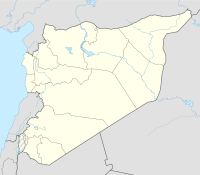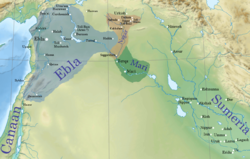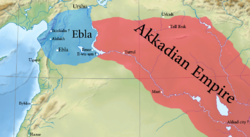Ebla

Ruins of the outer wall and the "Damascus Gate"
|
|
| Alternate name | Tell Mardikh تل مرديخ |
|---|---|
| Location | Idlib Governorate, Syria |
| Region | Levant |
| Coordinates | 35°47′53″N 36°47′53″E / 35.798°N 36.798°ECoordinates: 35°47′53″N 36°47′53″E / 35.798°N 36.798°E |
| Type | settlement |
| History | |
| Founded | c. 3500 BC |
| Abandoned | 7th century AD |
| Periods | Bronze Age |
| Cultures | Kish civilization, Amorite |
| Site notes | |
| Excavation dates | 1964–2011 |
| Archaeologists | Paolo Matthiae |
| Condition | Ruined |
| Ownership | Public |
| Public access | Yes |
| First Eblaite Kingdom | ||||||||
| Ebla | ||||||||
|
||||||||
|
The first kingdom at its greatest extent, including vassals
|
||||||||
| Capital | Ebla | |||||||
| Languages | Eblaite language | |||||||
| Religion | Levantine Religion. | |||||||
| Government | Monarchy | |||||||
| Historical era | Bronze Age | |||||||
| • | Established | c. 3000 BC | ||||||
| • | Disestablished | c. 2300 BC | ||||||
|
||||||||
| Today part of |
|
|||||||
| Second Eblaite Kingdom | |||||
| Ebla | |||||
|
|||||
|
Approximate borders of the second kingdom
|
|||||
| Capital | Ebla | ||||
| Government | Monarchy | ||||
| Historical era | Bronze Age | ||||
| • | Established | c. 2300 BC | |||
| • | Disestablished | c. 2000 BC | |||
| Third Eblaite Kingdom | ||||||||
| Ebla | ||||||||
|
||||||||
| Capital | Ebla | |||||||
| Languages | Amorite language. | |||||||
| Religion | Levantine Religion | |||||||
| Government | Monarchy | |||||||
| Historical era | Bronze Age | |||||||
| • | Established | c. 2000 BC | ||||||
| • | Disestablished | c. 1600 BC | ||||||
|
||||||||
Ebla (Arabic: إبلا, modern: تل مرديخ, Tell Mardikh), was one of the earliest kingdoms in Syria. Its remains constitute a tell located about 55 km (34 mi) southwest of Aleppo near the village of Mardikh. Ebla was an important center throughout the third millennium BC and in the first half of the second millennium BC. Its discovery proved the Levant was a center of ancient, centralized civilization equal to Egypt and Mesopotamia, and ruled out the view that the latter two were the only important centers in the Near East during the early Bronze Age. Karl Moore described the first Eblaite kingdom as the first recorded world power.
Starting as a small settlement in the early Bronze Age (c. 3500 BC), Ebla developed into a trading empire and later into an expansionist power that imposed its hegemony over much of northern and eastern Syria. Ebla was destroyed during the 23rd century BC; it was then rebuilt and was mentioned in the records of the Third Dynasty of Ur. The second Ebla was a continuation of the first, ruled by a new royal dynasty. It was destroyed at the end of the third millennium BC, which paved the way for the Amorite tribes to settle in the city, forming the third Ebla. The third kingdom also flourished as a trade center; it became a subject and an ally of Yamhad (modern-day Aleppo) until its final destruction by the Hittite king Mursili I in c. 1600 BC.
Ebla maintained its prosperity through a vast trading network. Artifacts from Sumer, Cyprus, Egypt and as far as Afghanistan were recovered from the city's palaces. The kingdom had its own language, Eblaite and the political organization of Ebla had features different from the Sumerian model. Women enjoyed a special status and the queen had major influence in the state and religious affairs. The pantheon of gods was mainly north Semitic and included deities exclusive to Ebla. The city was excavated starting in 1964, and became famous for the Ebla tablets, an archive of about 20,000 cuneiform tablets found there, dated to around 2350 BC. Written in both Sumerian and Eblaite and using the cuneiform, the archive has allowed a better understanding of the Sumerian language and provided important information over the political organization and social customs of the mid third millennium BC's Levant.
...
Wikipedia



